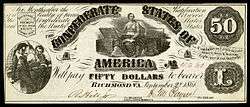Moneta
In Roman mythology, Moneta (Latin Monēta) was a title given to two separate goddesses: the goddess of memory (identified with the Greek goddess Mnemosyne) and an epithet of Juno, called Juno Moneta (Latin Iūno Monēta). The latter's name is source of numerous words in English and the Romance languages, including the words "money" and "mint".

The cult of the goddess Moneta was established largely under the influence of Greek religion that featured the cult of Mnemosyne ("Μνημοσύνη"), the goddess of memory and the mother of the Muses. The goddess's name is derived from Latin monēre (which means to remind, warn, or instruct). She is mentioned in a fragment of Livius Andronicus' Latin Odyssey: Nam diva Monetas filia docuit ("since the divine daughter of Moneta has taught...", frg. 21 Büchner), which may be the equivalent of either Od. 8,480-1 or 488.
The epithet Moneta given to Juno more likely derives from the Greek word "moneres" ("μονήρης") and means "alone, unique". By Andronicus' age, the folk-etymology deduction from monēre prevailed, and so he could transform this epithet into a separate goddess, the literary (but not religious) counterpart of Greek Mnemosyne.
Juno Moneta
Juno Moneta, an epithet of Juno, was the protectress of funds. As such, money in ancient Rome was coined in her temple. The word "moneta" is where we get the words "money", or "monetize", used by writers such as Ovid, Martial, Juvenal, and Cicero. In several modern languages including Russian and Italian, moneta (Spanish moneda) is the word for "coin".
As with the goddess Moneta, Juno Moneta's name is derived either from the Latin monēre, since, as protectress of funds, she "warned" of instability or more likely from the Greek "moneres" meaning "alone, unique".
Coinage
"Moneta" retained the meanings of "money" and "die" well into the Middle Ages and appeared often on minted coins. For example, the phrase moneta nova is regular on coins of the low countries and the rhineland in the fourteenth and fifteenth century, with the "nova", Latin for "new", not necessarily signifying a new type or variety of coin.[1]
In culture
Moneta is a central figure in John Keats' poem "The Fall of Hyperion: A Dream".
References
- ↑ B.H.I.H Stewart (1962). "Moneta and Mot on Anglo-Saxon Coins". British Numismatic Journal. 31: 27–30. Retrieved 27 December 2017.
- Simpson, D. P. (1968). Cassell's Latin Dictionary: 5th Edition. New York: Macmillan Publishing Co. ISBN 0-02-522570-7.
- The American Heritage dictionary of the English language: 4th Edition. New York: Houghton Mifflin Co. 2000. ISBN 0-02-522570-7.
- en.museicapitolini.org